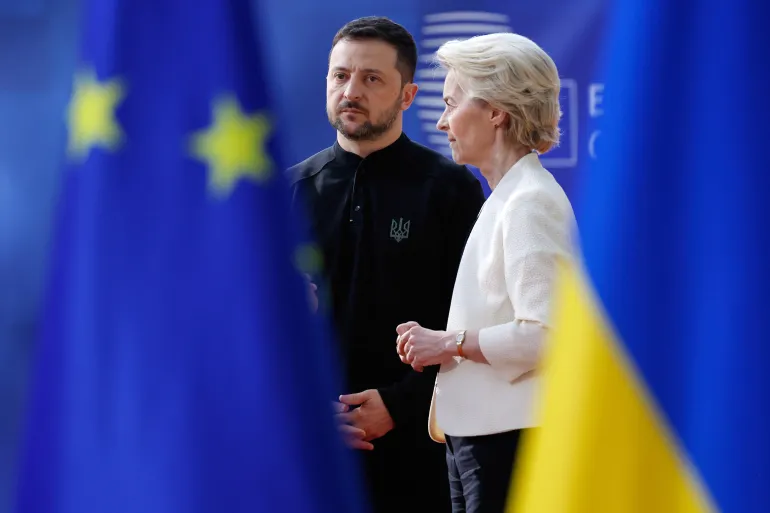The European Union is preparing a new set of economic tools—including trade tariffs and capital controls—to maintain financial pressure on Russia, even if Hungary vetoes the extension of the current sanctions regime, which expires in July.
According to the Financial Times, the European Commission has told ministers that a significant portion of the sanctions—such as the freezing of €200 billion ($224 billion) in Russian assets—could be repackaged under a different legal framework to bypass Budapest’s objection.
Hungary remains a roadblock
Hungarian Prime Minister Viktor Orban has consistently opposed EU-led boycotts of Moscow. His nationalist government, which relies on Russia for 85 percent of its natural gas, is widely regarded as the Kremlin’s closest ally within the bloc.
Peace talks coincide with sanctions shift
The EU’s latest push comes just as Russia and Ukraine resume direct peace talks for the first time since Moscow launched its full-scale invasion in February 2022. Representatives from both nations are meeting in Istanbul, though Russian President Vladimir Putin is not attending in person.
Ahead of the meeting, European leaders met in Ukraine and pushed for a 30-day ceasefire. Ukraine agreed. Russia did not.
Seventeenth sanctions package in place
On Wednesday, the EU adopted its 17th sanctions package against Russia, aimed at further weakening the Kremlin’s economy. Hungary signed off on the deal, which will be ratified next week.
Since 2022, Brussels has expanded its measures: banning Russian oil imports, capping fuel prices, and freezing assets held by Russia’s central bank in European financial institutions. The sanctions have also hit key sectors like media, aviation, and telecommunications, as well as Russian oligarchs and politicians.
The latest package targets 200 “shadow fleet” tankers—vessels with murky ownership and no links to Western insurers or banks—that help Russia circumvent sanctions. It also includes new restrictions on 30 companies, including Chinese and Turkish firms accused of enabling sanctions evasion.
“Russia has found ways to circumvent the blockage imposed by Europe and the United States, so closing the tap would grab Russia by the throat,” said French Foreign Minister Jean-Noel Barrot on BFM TV.
Sanctions still haven’t stopped the war
Despite these measures, sanctions have not ended the conflict. Russia’s economy, buoyed by high oil prices and increased military spending, has outperformed earlier forecasts.
“We will need to go further because the sanctions so far have not dissuaded Vladimir Putin from continuing his war of aggression … we must prepare to expand devastating sanctions that could suffocate, once and for all, Russia’s economy,” said Barrot.
Brussels considers new tools
Looking beyond the 17th package, the EU is eyeing additional measures such as capital controls and trade tariffs. Capital controls could restrict foreign investment, limit currency exchanges, or tax capital movement.
Other proposals, expected next month, include a ban on new Russian gas spot market contracts in 2025 and a full phase-out by 2027. Despite oil bans, Russia continues to earn billions from gas sales to the EU through LNG and the TurkStream pipeline. Spot market bans would curb these revenues.
Brussels may also consider tariffs on enriched uranium to reduce its energy dependence on Russia. Notably, the EU argues these new tools do not count as formal sanctions and therefore wouldn’t require unanimous support from all 27 member states.
“I think the EU cooked up these potential punishments to try and get Russia to agree to the 30-day ceasefire … it was the stick they were brandishing,” said an unnamed analyst.
The United States is also considering more aggressive measures. On May 1, Senator Lindsey Graham said he had secured backing from 72 senators for a bill that would introduce “bone-crushing” sanctions.
The draft legislation includes a 500 percent tariff on imports from any country buying Russian oil and fossil fuels. While former President Donald Trump has indicated he might pursue sanctions on Russia, he has also left the door open to re-engaging diplomatically.
Will this force Putin to negotiate?
Some analysts remain skeptical that added pressure will push Putin to the negotiating table.
“Most Russian people want life to return to normal and business owners are getting tired of war-related costs,” said the anonymous analyst. Still, she added, “Only because sanctions haven’t been able to do that, and there’s already a maze of them.”
According to risk platform Castellum.AI, Russia has faced 21,692 sanctions since the war began—most targeting individuals.
“On past performance, it’s hard to see how even more sanctions and additional punishments will stop the fighting,” she said, estimating a 60 percent chance that the war will still be ongoing at the end of the year.






